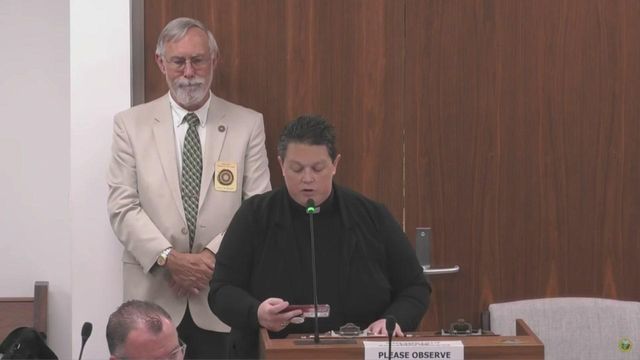New Chemours consent order steps up enforcement of GenX, related chemicals
After a month of public input, state environmental officials are asking a judge to sign off on a new enforcement agreement with Chemours, the company responsible for the decades-long release of largely unstudied chemicals into the Cape Fear River.
Chemours released per- and polyfluoroalkyl substances, commonly called PFAS, into the air and water for years from its Fayetteville Works plant near the border of Bladen and Cumberland counties. The discharges included GenX, which contaminated water downstream in the Cape Fear River as far as Wilmington.
The larger family of PFAS chemicals is unregulated, but the compounds are hard to remove from drinking water and some have been linked to cancer and other illnesses.
Chemours halted the release of GenX into the Cape Fear in the summer of 2017 after reports by the Wilmington StarNews sparked an investigation by state officials. But pollution downstream continued at lower concentrations due to air emissions, as well as residual groundwater and soil contamination.
Those continued sources of contamination are largely the target of the consent order filed by the state Department of Environmental Quality Wednesday in Bladen County Superior Court.
The revised version requires Chemours, among other things, to:
- Submit more frequent reporting of GenX air emissions
- Analyze PFAS and GenX contamination in sediment in the Cape Fear River
- Provide drinking water treatment for water fountains and sinks in public buildings
- Provide maintenance on filtration systems for at least 20 years.
Two of the most valuable components of the agreement, the Sierra Club's Erin Carey said, are the sediment studies and the toxicity testing – both direct responses to criticisms from the public concerned about the original order's lack of focus on health concerns.
"We know so little about these chemicals, which is crazy when you think about the volume released into the environment," said Carey, who serves as the Sierra Club's Wilmington-based coastal programs coordinator.
DEQ Secretary Michael Regan said the public comment period prompted regulators to "think creatively" about how to address concerns that the order didn't adequately address the impacts of the contamination downstream.
"We took a strong order, we listened to the public, we listened to the people who were impacted and we made that order stronger," Regan said in an interview with WRAL News Wednesday. "Our goal is to be sure this company takes the proper action to clean up its mess and be good neighbors to the people of North Carolina."
Along with a civil penalty of $12 million and another $1 million in investigative costs levied against Chemours, the revised order makes clear that the state can take future enforcement action if necessary – even against DuPont, which spun off Chemours in 2015.
The consent order filed Wednesday was signed by DEQ, Chemours and the Southern Environmental Law Center, the firm representing Cape Fear Riverkeeper Kemp Burdette in legal action over PFAS contamination.
In a statement, Burdette called the consent order "an important first step" in stopping pollution from the site.
"We are committed to seeing this process through until Chemours can prove that they have cleaned up the mess they have created," Burdette said.
Like the previous version released in late November for public comment, the order also requires Chemours to all but eliminate the emission of GenX and other PFAS compounds by the end of 2019 and provide advanced filtration systems for drinking water well owners with concentrations of the chemicals above the state's health goal.
Some of that work has already been implemented, Chemours spokesperson Lisa Randall said in a statement. She said the company will continue to work with state regulators and environmental groups to comply with the order, if approved.
"Chemours believes the Proposed Consent Order will address the concerns raised during the public comment period and intends to show our commitment through actions, not just words," Randall said in a statement. "We will continue to demonstrate our progress in a transparent way as we move forward."
The agreement will need the approval of Superior Court Judge Douglas Sasser before it goes into effect. SELC staff attorney Kelly Moser said that may take longer if water utilities downstream of the plant decide they still want to try to intervene in the case. As it stands, Moser said, the deal gives utilities "a seat at the table" by requiring DEQ to consult with them before approving any plans to reduce PFAS contamination.
Officials with the Cape Fear Public Utility Authority, which supplies water to Wilmington and the surrounding areas, said Wednesday they're reviewing the revised consent order.
"We look forward to working with our partners at NCDEQ to determine the best way to ensure our community has access to safe drinking water and that polluters such as Chemours are held to account, legally and financially," said Jim Flechtner, CFPUA executive director.
The month-long comment period on the initial consent order draft in 2018 drew nearly 400 responses from the public, including representatives from the state chapter of the Sierra Club. With so many unanswered questions around the chemicals, Carey said residents downstream of the plant like her felt a lot of helplessness after news of the contamination broke. She's glad those public comments – especially those encouraging more of a focus on health impacts – were taken seriously.
"To know that somebody's listening and somebody's paying attention is heartening," Carey said.











